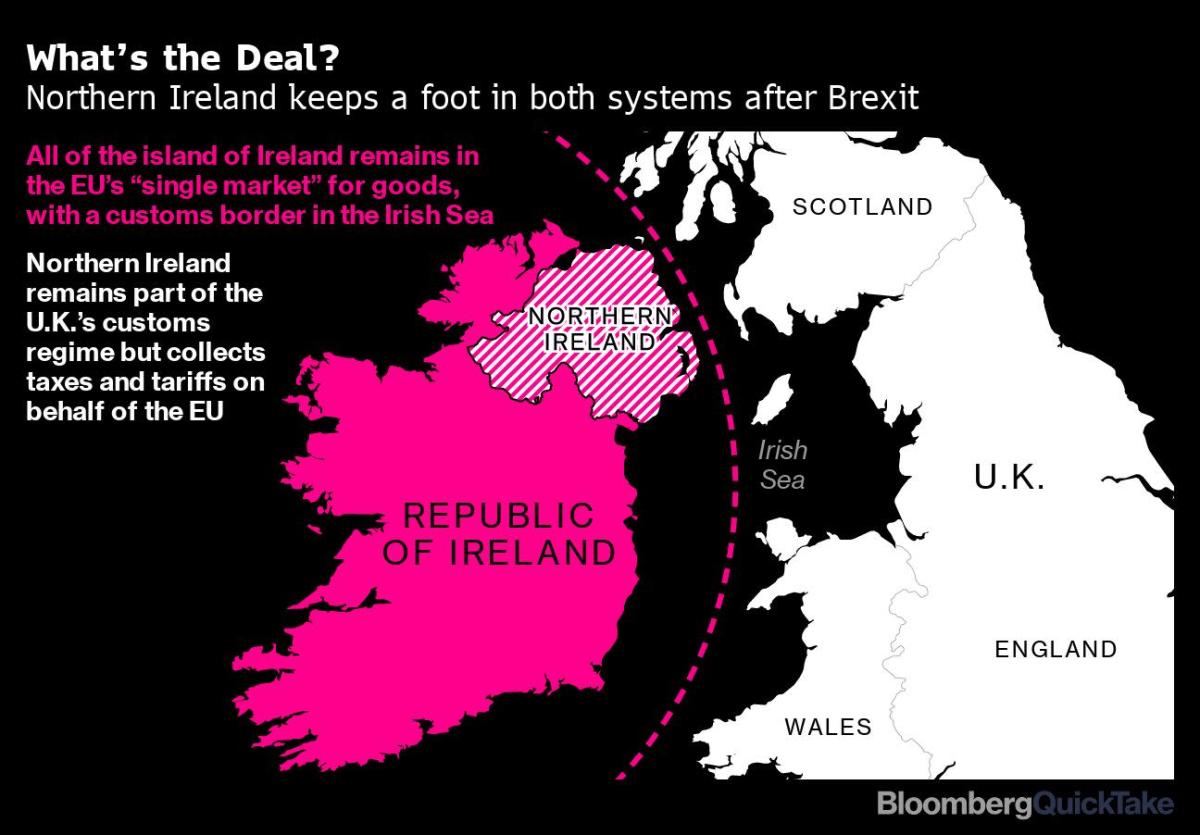
(Bloomberg) — The EU’s chief Brexit negotiator Maros Sefcovic said he won’t contemplate a hard border on the island of Ireland, while suggesting that the UK’s plan to override the part of the Brexit deal governing trade in Northern Ireland may harm European cooperation with Britain on financial services.
Most Read from Bloomberg
Speaking at Bloomberg’s London office on Wednesday evening, Sefcovic said the EU can’t accept Britain’s efforts to “unilaterally and illegally” dis-apply the arrangements in the Brexit deal that keep Northern Ireland in the bloc’s single market while creating a customs border with the rest of the UK. But he also stressed the importance of protecting the 1998 peace deal for the region by preventing the return of a hard border with Ireland.
“I would not even consider this possibility, because this is definitely not in the cards,” Sefcovic told Bloomberg TV’s Guy Johnson after delivering a speech to a business audience. “We are very clear with that with our Irish friends; I think that was a huge point of preoccupation in the United States.”
While Sefcovic didn’t rule out suspending the bloc’s trade deal with the UK, his remarks raise the question of where such an action would leave a customs border. His comments also underlined the deterioration in the EU-UK relationship after Prime Minster Boris Johnson’s government earlier this month introduced a bill into Parliament to allow ministers to rip-up the regulatory framework for Northern Ireland that both sides agreed to in 2019.
How Johnson Is Taking UK Into New Trade Rift With EU: QuickTake
The move by the British government casts “a long shadow” over the relationship with the EU, which “increases our vigilance,” Sefcovic said. He warned that the EU’s decision to grant British firms market access to financial services, data and certain food products is conditioned on the UK’s current regulatory framework. “In other words, an end of mutual recognition is a possibility if the UK changes its standards,” he said.
Sefcovic began his speech with a dig at Johnson’s slogan in the run-up to the UK’s last general election in 2019, saying “it’s high time we got Brexit done.” He said Britain’s plan to rip up the Brexit deal won’t work and will lead to “constant uncertainty.”
“It’s not for London to unilaterally change the game and decide what goes into the EU single market,” he said.
Sefcovic is visiting London at a time when both his negotiating counterpart, Foreign Secretary Liz Truss, and the prime minister are out of the country. He said he was in the UK to communicate to businesses and lawmakers in the House of Lords and House of Commons the details of the EU’s offer to resolve the impasse.
‘Radio Silence’
He said he last met Truss face-to-face in February and had proposed “intense, structured, technical discussions on all the issues,” but encountered only “radio silence” until she called to tell him of the UK’s intention to put forward the legislation to override the protocol. That put negotiators “two years back in our discussions,” he said.
The UK legislation would separate goods flowing between Britain and Northern Ireland from goods intended for the EU into green and red channels, and allow businesses in region to choose whether they follow UK or EU standards, or both. It would also extend UK subsidy controls and tax breaks, including changes to value-added tax, to Northern Ireland, and strip the European Court of Justice of its role in settling disputes in the region over the Brexit deal. The EU responded to Johnson’s plan by restarting legal proceedings against the UK.
Johnson has said he wants the legislation to complete its passage through Parliament by year-end, though it’s likely to face opposition in the House of Lords, which could delay its progress. The bill passed its second reading in the House of Commons this week.
The EU showed “unprecedented flexibility” when it proposed reductions to customs checks in October, Sefcovic said, contrasting the bloc’s “robust offer” to the UK’s “my way or the highway” approach. But he said the EU “has its limits” and it’s “unrealistic and unfair” for the UK to expect all barriers to trade between the UK and Northern Ireland to be lifted.
“You are not going to negotiate when you have a gun on the table,” Sefcovic said.
Most Read from Bloomberg Businessweek
©2022 Bloomberg L.P.




